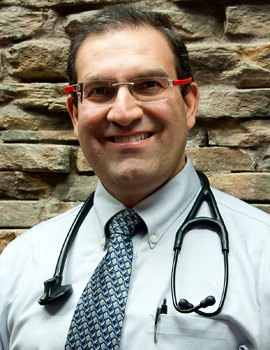Author: Dr. Bashar Markabawi
Answer: Sudden death is usually defined as an unexpected death in people younger than 35, unrelated to trauma or violence due to heart problems. Fortunately, this is a relatively low occurrence. Sudden death accounts for 1/200,000 annual deaths or 10-25 death per year.
Hypertrophic Cardiomyopathy is an important cause of this medical problem. When the heart muscle becomes abnormally thick, mainly in the divider between the bottom chambers (septum), this can lead to sudden abnormal and lethal heart rhythm. This rhythm is often provoked by exercise and accounts for about 24% of all causes of sudden cardiac death.
Another important cause is abnormalities of the arteries that supply oxygen to the heart muscle, known as coronary arteries. Some people are born with abnormal connections – or takeoffs – of these arteries. These arteries can be compressed during exercise, resulting in dangerous heart rhythms and death. This accounts for 18% of the sudden death cases.
Long QT syndrome, an inherited genetic disorder of one of the heart electrical channels, can predispose individuals to the development of dangerous and lethal arrhythmias, which, sadly, are often recognized too late. An EKG can often make this diagnosis. Confirmation with genetic testing is also widely available.
A family history of sudden cardiac death before the age of 50 should prompt all patients to seek evaluation by a cardiologist or cardiac electrophysiologist. Unexplained fainting or rapid palpitations should be immediately evaluated to rule out these dangerous causes of sudden death.
Although there is a debate about screening in high school athletes, an ECG, or echocardiogram, may help rule out these disorders.
A history and physical exam every two years is recommended for athletes between ages 10-21. Please consider consulting a cardiologist for further evaluation.

